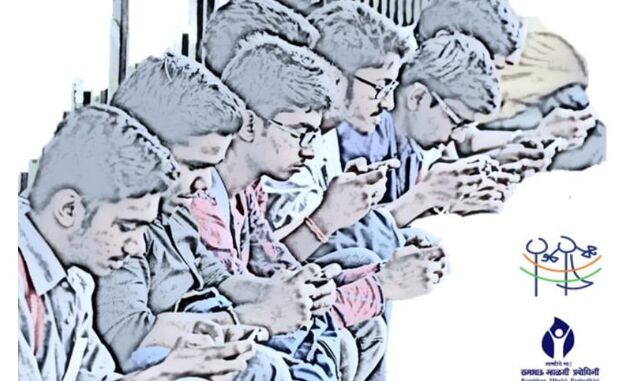Nationwide NCPCR survey on smartphones and education: 37% kids report reduced concentration

New Delhi: A countrywide survey on the effects of mobile phone usage on the education and learning abilities of children more than one year into the pandemic has now shown among many interesting findings that more than 40 per cent of surveyed children thought the pandemic had negatively impacted education.
In addition, the study found that a large number - over 37 per cent - of children in the survey had reported reduced concentration due to smartphone usage. In addition, over 70 per cent teachers in the survey said they had to use smartphones for the first time due to the pandemic.
The study was conducted by the National Commission for the Protection of Child Rights and was named "Effects of Use of Mobile Phone & Other Devices with Internet on School Children".
NCPCR Chairperson Priyank Kanoongo said NCPCR conducted a research study to understand physical, behavioural, and psycho-social effects on children from using mobile phones and other devices with internet accessibility.
The research study was exploratory and made use of quantitative techniques like the survey method, and qualitative techniques like Focused Group Discussion (FGD).
"Since this was a nationwide study of all regions (East, West, North, South, and North-East regions), 15 locations were selected across India with 3 areas and 1000 respondents per region," he said.
According to the research design; one metropolitan city and adjoining urban and rural areas were selected for data collection. These cities according to the plan were Delhi, Hyderabad, Mumbai, Bhubaneswar, Ranchi and Guwahati in North, South, West, East and North-East regions respectively and the North-East (Assam).
In each region, the study targeted to collect data from 12 schools, including six schools in the metropolitan city, four from urban and two from rural. Hence, a total of 60 schools were targeted for the survey. The further break-up of the sample of schools was done in three categories (private high-income schools, budget private schools and government schools).
As per NCPCR, the sampling included three categories of respondents, as suggested in the methodology, and the total number of responses collected were 5,811 participants, consisting of 3,491 school-going children, 1,534 parents and 786 teachers from 60 schools, across six states in the country.
The total number of children respondents was 3,491 and of all the valid responses 50.9 per cent were male and 49.1 per cent female. The analysis of data revealed that data showed that the most prominent means to access smartphones and the internet for children are through their parent's phones (62.6 per cent of all valid respondents used their parents' phones).
"It is also interesting to note that 30.2 per cent of the children of all age groups (8 to 18 years) already possess their own smartphones and use the same for all purposes," the report shows.
The trend line of the percentage of children using their smartphones shows a steep rise from the age of 13 years and onwards. In comparison to this, the trend line of children using laptops, tablets to access the internet is stable across all ages.
The major activity for which children use smartphones, internet devices these days is 'Online learning and classes', 94.8 per cent of all valid respondents were of this opinion.
As per the child rights body, when asked about the features, facilities that children like to use or enjoy using on smartphones, internet devices, 52.9 per cent answered as 'Chatting (using instant messaging apps like WhatsApp, Facebook, Instagram, Snapchat)'.
While the most common purpose is using internet-enabled devices for online learning, classes, only 10.1 per cent of children like to use smartphones for learning activities.
The study's data show that 42.9 per cent of all valid respondents amongst children confessed to having a social networking account. "Among those children who have accounts on the major social networking apps, sites which they use, Facebook (used by 36.8 per cent) – Instagram (used by 45.50 per cent) are the most popular," the report shows.
The collected data reveals that 23.80 per cent of children use smartphones while they are in bed, before going to sleep, which is quite a substantial proportion and a cause for concern whereas only 32.7 percent of children never check their smartphones while studying. Approximately 37.15 percent of children, always or frequently, experience reduced levels of concentration due to smartphone use.
According to parents who participated in the study, the best way of using smartphones by children is 'to help with homework' with 37.2 percent. Most of the teachers (54.1 per cent of them) who participated in the study believed the use of smartphones in the classroom is immensely or somewhat distracting. Meanwhile, 72.70 percent of teachers had no prior experience of using smartphones, internet devices.
As per officials, children need to be made aware of internet safety rules and instructed not to share any personal information on social media sites and encourage privacy settings. Schools should advocate, model and teach safe, legal, and ethical use of digital information and technology; promote and model responsible social interactions related to the use of technology and information.
"More than 9 in 10 children participating in the study think that the world that they live in today is addicted to cell phones whereas a large majority of children believe that using the internet has very much or partially increased their creativity, which is 31.5 percent and 40.5 percent respectively," the report shows.



